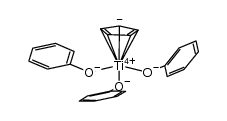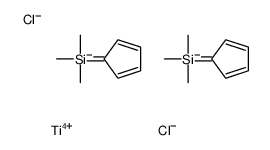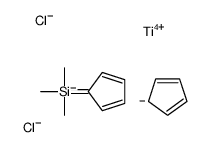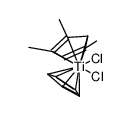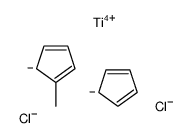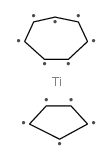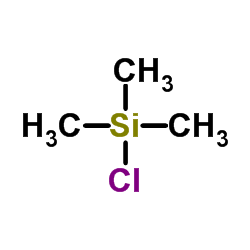1270-98-0
| 中文名 | 三氯一茂钛 |
|---|---|
| 英文名 | cyclopentadienyltitanium trichloride |
| 中文别名 |
三氯化环戊二烯基钛
环戊二烯钛三氯化物 (Η-环戊二烯基)三氯化钛 环戊二烯基三氯化钛(IV) |
| 英文别名 |
(cyclopentadienyl)TiCl3
MFCD00003724 Cyclopenta-1,3-dien-1-yltitanium(3+) trichloride TRICHLORO(CYCLOPENTADIENYL)TITANIUM(IV) trichlorocyclopentadienyl-titaniu Trichloro(cyclopentadienyl)titanium Cyclopentadienyltitanium trichloride Cyclopentadienyltrichlorotitanium Trichloro(cyclopentyldienyl)titanium Cyclopentadiene titanium trichloride 1,3-Cyclopentadien-1-yltitanium(3+) trichloride Titanium(3+), 1,3-cyclopentadien-1-yl-, chloride (1:3) CyclopentadienyltitaniuM(IV) Trichloride |
| 沸点 | 41.5ºCat 760 mmHg |
|---|---|
| 熔点 | 210 °C (dec.)(lit.) |
| 分子式 | C5H5Cl3Ti |
| 分子量 | 219.319 |
| 闪点 | >210ºC |
| 精确质量 | 217.893631 |
| LogP | 3.09000 |
| 外观性状 | 固体;Light yellow to Brown powder to crystaline |
| 蒸汽压 | 418mmHg at 25°C |
| 折射率 | 1.47 |
| 储存条件 | 保持贮藏器密封、储存在阴凉、干燥的地方,确保工作间有良好的通风或排气装置 |
| 稳定性 | 如果遵照规格使用和储存则不会分解,未有已知危险反应,避免氧化物、水分/潮湿 |
| 分子结构 | 1、摩尔折射率:无可用的 2、摩尔体积(cm3/mol):无可用的 3、等张比容(90.2K):无可用的 4、表面张力(dyne/cm):无可用的 5、介电常数:无可用的 6、极化率(10-24cm3):无可用的 7、单一同位素质量:217.89363 Da 8、标称质量:218 Da 9、平均质量:219.3192 Da |
| 计算化学 | 1、 氢键供体数量:0 2、 氢键受体数量:5 3、 可旋转化学键数量:0 4、 拓扑分子极性表面积(TPSA):0 5、 重原子数量:9 6、 表面电荷:-5 7、 复杂度:66.1 8、 同位素原子数量:0 9、 确定原子立构中心数量:0 10、 不确定原子立构中心数量:0 11、 确定化学键立构中心数量:0 12、 不确定化学键立构中心数量:0 13、 共价键单元数量:2 |
| 更多 | 1. 性状:橙色或黄色粉末 2. 密度(g/cm3,20℃):未确定 3. 相对蒸汽密度(g/mL,空气=1):未确定 4. 熔点(ºC):210 5. 沸点(ºC,常压):未确定 6. 沸点(ºC,1mmHg):未确定 7. 折射率(n20/D):未确定 8. 闪点(ºC):未确定 9. 比旋光度(º):未确定 10. 自燃点或引燃温度(ºC):未确定 11. 蒸气压(mmHg,20ºC):未确定 12. 饱和蒸气压(kPa,60ºC):未确定 13. 燃烧热(KJ/mol):未确定 14. 临界温度(ºC):未确定 15. 临界压力(KPa):未确定 16. 油水(辛醇/水)分配系数的对数值:未确定 17. 爆炸上限(%,V/V):未确定 18. 爆炸下限(%,V/V):未确定 19. 溶解性:反应 |
Synonym:Cyclopentadienyltitanium(IV) trichloride; Cyclopentadienyltrichlorotitanium; pi-Cyclopentadienyltrichlorotitanium(IV); Titanium, trichlorocyclopentadienyl-; Titanium, trichloro-pi-cyclopentadienyl-; Titanium, trichloro(eta(sup 5)-2,4-c Section 2 - COMPOSITION, INFORMATION ON INGREDIENTS
Risk Phrases: 34 Section 3 - HAZARDS IDENTIFICATION EMERGENCY OVERVIEW
Causes burns.Corrosive.Moisture sensitive. Potential Health Effects Eye: Causes eye burns. Skin: Causes skin burns. Ingestion: May cause severe and permanent damage to the digestive tract. Causes gastrointestinal tract burns. May cause headache. May cause nausea and vomiting. Inhalation: May cause irritation of the respiratory tract with burning pain in the nose and throat, coughing, wheezing, shortness of breath and pulmonary edema. Causes chemical burns to the respiratory tract. Inhalation may be fatal as a result of spasm, inflammation, edema of the larynx and bronchi, chemical pneumonitis and pulmonary edema. Chronic: No information found. Section 4 - FIRST AID MEASURES Eyes: Get medical aid immediately. Do NOT allow victim to rub eyes or keep eyes closed. Extensive irrigation with water is required (at least 30 minutes). Skin: Get medical aid immediately. Immediately flush skin with plenty of water for at least 15 minutes while removing contaminated clothing and shoes. Wash clothing before reuse. Destroy contaminated shoes. Ingestion: Do not induce vomiting. If victim is conscious and alert, give 2-4 cupfuls of milk or water. Never give anything by mouth to an unconscious person. Get medical aid immediately. Inhalation: Get medical aid immediately. Remove from exposure and move to fresh air immediately. If breathing is difficult, give oxygen. Do NOT use mouth-to-mouth resuscitation. If breathing has ceased apply artificial respiration using oxygen and a suitable mechanical device such as a bag and a mask. Notes to Physician: Section 5 - FIRE FIGHTING MEASURES General Information: As in any fire, wear a self-contained breathing apparatus in pressure-demand, MSHA/NIOSH (approved or equivalent), and full protective gear. During a fire, irritating and highly toxic gases may be generated by thermal decomposition or combustion. Extinguishing Media: Use foam, dry chemical, or carbon dioxide. Do NOT get water inside containers. Section 6 - ACCIDENTAL RELEASE MEASURES General Information: Use proper personal protective equipment as indicated in Section 8. Spills/Leaks: Vacuum or sweep up material and place into a suitable disposal container. Avoid runoff into storm sewers and ditches which lead to waterways. Clean up spills immediately, observing precautions in the Protective Equipment section. Provide ventilation. Do not get water inside containers. Section 7 - HANDLING and STORAGE Handling: Wash thoroughly after handling. Wash hands before eating. Minimize dust generation and accumulation. Do not breathe dust, vapor, mist, or gas. Keep container tightly closed. Do not get on skin or in eyes. Use with adequate ventilation. Do not allow contact with water. Discard contaminated shoes. Keep from contact with moist air and steam. Storage: Keep container closed when not in use. Store in a cool, dry, well-ventilated area away from incompatible substances. Corrosives area. Store protected from moisture. Section 8 - EXPOSURE CONTROLS, PERSONAL PROTECTION Engineering Controls: Facilities storing or utilizing this material should be equipped with an eyewash facility and a safety shower. Use adequate ventilation to keep airborne concentrations low. Exposure Limits CAS# 1270-98-0: Personal Protective Equipment Eyes: Wear appropriate protective eyeglasses or chemical safety goggles as described by OSHA's eye and face protection regulations in 29 CFR 1910.133 or European Standard EN166. Skin: Wear appropriate protective gloves to prevent skin exposure. Clothing: Wear appropriate protective clothing to minimize contact with skin. Respirators: A respiratory protection program that meets OSHA's 29 CFR 1910.134 and ANSI Z88.2 requirements or European Standard EN 149 must be followed whenever workplace conditions warrant respirator use. Section 9 - PHYSICAL AND CHEMICAL PROPERTIES Physical State: Powder Color: yellow-orange Odor: Not available. pH: Not available. Vapor Pressure: Not available. Viscosity: Not available. Boiling Point: Decomposes Freezing/Melting Point: 170 deg C Autoignition Temperature: Not available. Flash Point: Not available. Explosion Limits, lower: Not available. Explosion Limits, upper: Not available. Decomposition Temperature: 210 deg C Solubility in water: Specific Gravity/Density: Molecular Formula: C5H5Cl3Ti Molecular Weight: 219.36 Section 10 - STABILITY AND REACTIVITY Chemical Stability: Stable under normal temperatures and pressures. Conditions to Avoid: Incompatible materials, dust generation, moisture, excess heat, exposure to moist air or water. Incompatibilities with Other Materials: Strong acids, strong bases, strong oxidizing agents, strong reducing agents. Hazardous Decomposition Products: Hydrogen chloride, carbon monoxide, irritating and toxic fumes and gases, carbon dioxide, titanium/titanium oxides. Hazardous Polymerization: Has not been reported. Section 11 - TOXICOLOGICAL INFORMATION RTECS#: CAS# 1270-98-0: XR1927300 LD50/LC50: Not available. Carcinogenicity: Cyclopentadienyltitanium Trichloride - Not listed by ACGIH, IARC, or NTP. Other: See actual entry in RTECS for complete information. Section 12 - ECOLOGICAL INFORMATION Section 13 - DISPOSAL CONSIDERATIONS Dispose of in a manner consistent with federal, state, and local regulations. Section 14 - TRANSPORT INFORMATION IATA Shipping Name: CORROSIVE SOLID, N.O.S.* Hazard Class: 8 UN Number: 1759 Packing Group: III IMO Shipping Name: CORROSIVE SOLID, N.O.S. Hazard Class: 8 UN Number: 1759 Packing Group: III RID/ADR Shipping Name: CORROSIVE SOLID, N.O.S. Hazard Class: 8 UN Number: 1759 Packing group: III Section 15 - REGULATORY INFORMATION European/International Regulations European Labeling in Accordance with EC Directives Hazard Symbols: C Risk Phrases: R 34 Causes burns. Safety Phrases: S 25 Avoid contact with eyes. S 36/37/39 Wear suitable protective clothing, gloves and eye/face protection. S 45 In case of accident or if you feel unwell, seek medical advice immediately (show the label where possible). WGK (Water Danger/Protection) CAS# 1270-98-0: No information available. Canada CAS# 1270-98-0 is listed on Canada's DSL List. CAS# 1270-98-0 is not listed on Canada's Ingredient Disclosure List. US FEDERAL TSCA CAS# 1270-98-0 is not listed on the TSCA inventory. It is for research and development use only. SECTION 16 - ADDITIONAL INFORMATION N/A |
|
毒理学数据: 1、急性毒性:小鼠注射LD50:130mg/kg 生态学数据: 对是水稍微有危害的不要让未稀释或大量的产品接触地下水、水道或者污水系统,若无政府许可,勿将材料排入周围环境。 CHEMICAL IDENTIFICATION
HEALTH HAZARD DATAACUTE TOXICITY DATA
|
| 危害码 (欧洲) | C |
|---|---|
| 风险声明 (欧洲) | R34 |
| 安全声明 (欧洲) | S26-S28-S36/37/39-S45 |
| 危险品运输编码 | UN 3261 8/PG 2 |
| WGK德国 | 3 |
| RTECS号 | XR1927300 |
| 包装等级 | II |
| 危险类别 | 8 |
| 海关编码 | 2931900090 |
| 上游产品 8 | |
|---|---|
| 下游产品 9 | |
| 海关编码 | 2931900090 |
|---|---|
| 中文概述 | 2931900090. 其他有机-无机化合物. 增值税率:17.0%. 退税率:13.0%. 监管条件:AB(入境货物通关单,出境货物通关单). 最惠国关税:6.5%. 普通关税:30.0% |
| Summary | 2931900090. other organo-inorganic compounds. VAT:17.0%. Tax rebate rate:13.0%. Supervision conditions:AB(certificate of inspection for goods inward,certificate of inspection for goods outward). MFN tariff:6.5%. General tariff:30.0% |



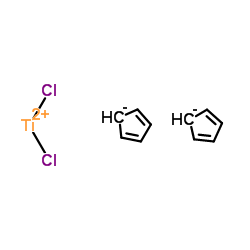

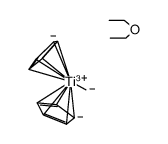


![[(η5-C5H5)TiCl]2(μ-MeN)2结构式](https://image.chemsrc.com/caspic/047/87654-36-2.png)

